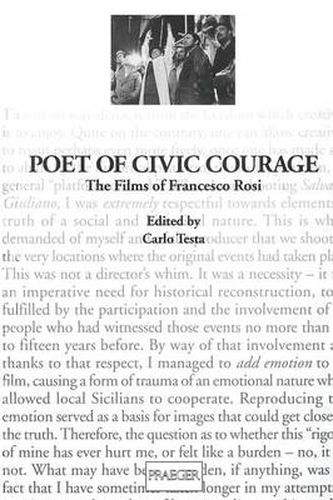Readings Newsletter
Become a Readings Member to make your shopping experience even easier.
Sign in or sign up for free!
You’re not far away from qualifying for FREE standard shipping within Australia
You’ve qualified for FREE standard shipping within Australia
The cart is loading…






Rosi’s films consistently and directly address the themes of political and institutional corruption and the complex relationship between the individual, the mafia, and the state. Whether evoking the multiple facets of Sicilian banditry in Salvatore Giuliano (1962), exposing right-wing killing squads in Cadaveri eccellenti (Illustrious Corpses) (1976), or courageously debating the roots of Italian terrorism in ^ITre fratelli (Three Brothers)^R (1981), his gripping political-documentary works have managed to combine factual and intellectual rigor with box office success and wide critical acclaim. This book offers a series of essays by leading Italian academics, each exploring a key Rosi film, together with an interview and comprehensive bibliographic and filmographic material. A notable feature is an article by the director himself, in which he reflects on the development and future of Italian political cinema.
This book offers a series of essays by leading Italian academics, each exploring a key Rosi film, together with an interview and comprehensive bibliographic and filmographic material. A notable feature is an article by the director himself, in which he reflects on the development and future of Italian political cinema.
$9.00 standard shipping within Australia
FREE standard shipping within Australia for orders over $100.00
Express & International shipping calculated at checkout
Rosi’s films consistently and directly address the themes of political and institutional corruption and the complex relationship between the individual, the mafia, and the state. Whether evoking the multiple facets of Sicilian banditry in Salvatore Giuliano (1962), exposing right-wing killing squads in Cadaveri eccellenti (Illustrious Corpses) (1976), or courageously debating the roots of Italian terrorism in ^ITre fratelli (Three Brothers)^R (1981), his gripping political-documentary works have managed to combine factual and intellectual rigor with box office success and wide critical acclaim. This book offers a series of essays by leading Italian academics, each exploring a key Rosi film, together with an interview and comprehensive bibliographic and filmographic material. A notable feature is an article by the director himself, in which he reflects on the development and future of Italian political cinema.
This book offers a series of essays by leading Italian academics, each exploring a key Rosi film, together with an interview and comprehensive bibliographic and filmographic material. A notable feature is an article by the director himself, in which he reflects on the development and future of Italian political cinema.